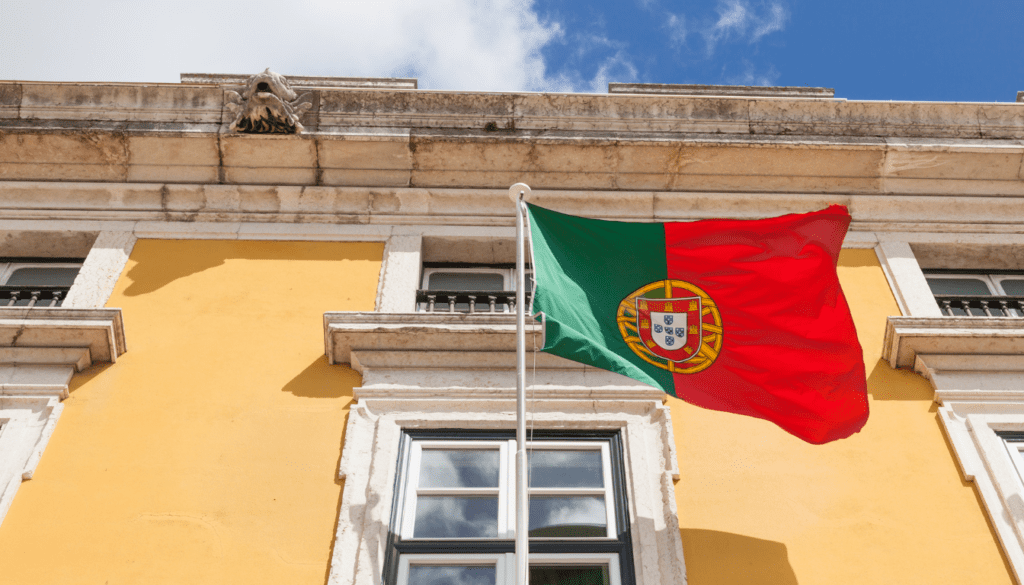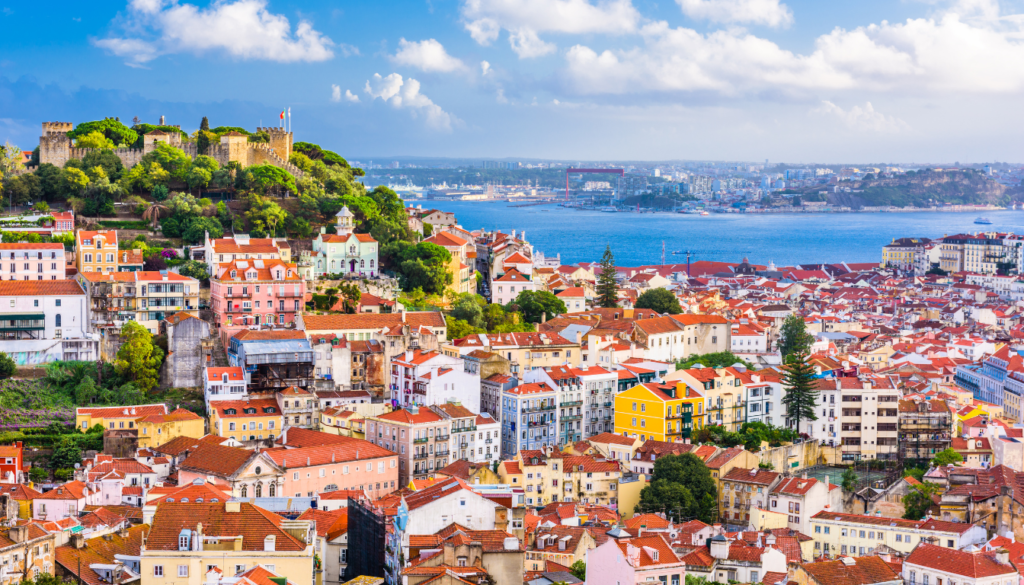Planning a trip to Portugal and worried about visa stuff? I’ve been around and I know visa hassles can be tough. But, don’t worry too much! This guide will help you get ready for your Portugal adventure with ease.
It covers everything, from visa-free travel for Schengen Area members to COVID-19 rules for entry. No matter if it’s your first time or you’re a pro at traveling, we’ll go over the visa journey together.
Key Takeaways
- Understand the different visa requirements for visiting Portugal based on your country of origin.
- Learn about the Schengen Area and which countries enjoy visa-free travel to Portugal.
- Discover the application process and required documents for obtaining a Schengen visa to visit Portugal.
- Familiarize yourself with the new ETIAS program and how it affects your Portugal travel plans.
- Ensure you have the necessary travel insurance and emergency preparedness for a safe and enjoyable trip to Portugal.
Understanding Visa Requirements for Visiting Portugal

Portugal is part of the Schengen Area. This allows visa-free travel for citizens from other member states. If you’re from one of the 26 Schengen countries, you can visit Portugal for up to 90 days without a visa. This is within a 180-day period.
Schengen Area Citizens and Visa-Free Travel
If you’re from a Schengen country, you have it easy. You can travel within Portugal and the Schengen region freely, without a visa. But, if your stay is longer than 3 months, you’ll need to get a registration certificate from local authorities.
Non-Schengen Countries with Visa-Free Access
Many non-EU countries also get visa-free access to Portugal for 90 days. This list includes the UK, Canada, New Zealand, Australia, the US, Israel, Japan, and Singapore. Once your 90 days are up, you must leave the Schengen Area for 90 days before returning.
| Visa Requirements for Portugal | Schengen Area Citizens | Non-Schengen Countries with Visa-Free Access |
|---|---|---|
| Visa Required | No | No (for stays up to 90 days) |
| Maximum Stay | 90 days within 180-day period (registration certificate required for stays longer than 3 months) | 90 days within 180-day period |
| Re-entry Requirement | No | Must leave Schengen Area for 90 days before re-entering |
Remember, visa requirements can change. Always check the latest info before your trip. Look at official government websites for the most up-to-date information.
visa requirements for traveling to Portugal

Planning a trip to Portugal means thinking about visas. It’s vital for a hassle-free travel experience. Some countries let you enter Portugal without a visa. But others need their citizens to get specific paperwork first.
Countries Requiring a Visa to Visit Portugal
Citizens from places like India, Pakistan, Nepal, Turkey, and South Africa need a visa for Portugal. The usual visa for tourists is the Schengen. This visa lets travelers move between Schengen countries, including Portugal, for up to 90 days.
Obtaining a Schengen Visa for Portugal
To get a Schengen visa, visit the closest Portuguese embassy or consulate. It costs €80 for adults and €40 for kids aged 6 to 12. If you’re from the US, UK, or Australia, you can visit Portugal for 90 days within six months without a visa.
For a longer stay, consider the Youth Mobility Visa. It offers stays of up to a year in Portugal. You can also work for up to six months. This program is open to citizens of select countries between 18 and 30 (31 in Peru and Australia; 35 in Canada).
Journeying to Portugal got easier on July 1, 2022, as COVID-19 travel rules were dropped. Yet, a new system called ETIAS is set to start in mid-2024. It will request an online form, passport details, and a fee of about €7 per traveler from various countries.
No matter where you’re from, look into today’s visa rules for Portugal before you travel. Planning early and knowing visa requirements lets you fully enjoy your time in this stunning European spot.
Applying for a Portuguese Youth Mobility Visa

Are you a young adventurer who wants to explore Portugal and work there? The Portuguese Youth Mobility Visa might be just what you need. It allows citizens from certain countries to visit Portugal for a year. You can work there for up to 6 months.
To get this visa, you need to be between 18 and 30 (or up to 31 in Peru and Australia; 35 in Canada). You also must be from one of the eligible countries. These include Argentina, Australia, Canada, and more.
The process to apply for the portugal youth mobility visa may differ by country. But, some things are the same for everyone. You’ll need to show you have a return ticket, enough money for your stay, and a clean police record from places you’ve lived in for over a year.
| Country | Maximum Visas/Permits | Age Limit |
|---|---|---|
| Argentina | 100 | 18-30 |
| Australia | 500 | 18-31 |
| Canada | 400 | 18-35 |
| Chile | 100 | 18-30 |
| Japan | N/A | 18-30 |
| New Zealand | 50 | 18-30 |
| Peru | 400 | 18-31 |
| South Korea | 200 | 18-30 |
| United States | N/A | 18-30 |
Keep in mind that working holiday visa portugal rules can change. Always check the newest requirements before you apply. The visa process might take up to 4 weeks. So, it’s smart to apply as soon as you can and have all documents ready.
If you’re eager to dive into Portugal’s rich culture, work abroad, or just travel, consider this visa. It’s a great chance for young explorers. Why wait? Start planning your trip now!
Preparing Necessary Documentation

Required Documents for Schengen Visa Application
When you apply for a short-stay Schengen visa to visit Portugal, you will need several documents. These include a filled and signed application form, a passport photo, and a travel document valid for at least 3 months after leaving the Schengen area.
You must also show proof of your financial situation and work. This could be a certificate of employment, bank statements, and enough funds for your trip’s expenses. Make sure you have a travel medical insurance policy that lasts the whole trip.
If you’re visiting Portugal for a specific reason, you might need extra documents. This could be hotel bookings, invitation letters, or medical treatment proof. Always check the harmonized documents table for what you need, based on where you’re from.
Minors traveling alone or without their guardians must have a parental consent authorization letter. This is needed under Portuguese law. If you’re staying with a family member, you need to prove your relationship to them.
It’s important to be very careful and thorough when getting all the documents you need for a Portugal visa and Schengen visa application requirements. Being prepared will make the visa process go smoothly.
“Proper documentation is the key to a seamless visa application process. Ensuring you have all the required Schengen visa application requirements can save you time and headaches down the road.”
Travel Safety and Security Considerations

Traveling to Portugal means looking out for possible security threats. It’s wise to take steps for your personal safety. Portugal is known as a safe place, but it’s best to stay alert. This is especially true in busy spots and on public transport.
Crime Prevention and Personal Safety Tips
When it comes to staying safe from crimes like theft and pickpocketing in Portugal, these tips can help:
- Safeguard your passport, identity documents, and valuables at all times.
- Avoid leaving personal items unattended in public places.
- Use caution when withdrawing money from ATMs and be wary of accepting open drinks from strangers.
- Steer clear of dimly lit or isolated areas, especially at night.
- Keep a close eye on your belongings when using public transportation, such as buses, trains, and taxis.
- Stay alert and trust your instincts if a situation feels unsafe.
Knowing about crime prevention in Portugal is crucial. Very few violent crimes happen against tourists. But be careful with e-scooters, taxis, and tuk-tuks. Keep up with the local news and follow advice during emergencies.
| Common Safety Concerns in Portugal | Precautions to Take |
|---|---|
| Motor vehicle accidents and road fatalities | Use caution when driving, wear seatbelts, and obey traffic laws. |
| E-scooter incidents | Exercise caution when using e-scooters, especially in urban areas. |
| Taxi and tuk-tuk related issues | Use reputable taxi services, avoid hailing taxis on the street, and negotiate fares upfront. |
| Petty crimes like pickpocketing and bag snatching | Keep valuables secure, be aware of your surroundings, and avoid isolated areas. |
| Strikes and public demonstrations | Monitor local news and avoid areas where demonstrations are taking place. |
By keeping informed, staying alert, and taking easy steps, your travel to Portugal can be both safe and fun.
Extending Your Stay in Portugal

Want to stay in Portugal beyond 90 days? You need to extend your visa. To do this, contact the Serviço de Estrangeiros e Fronteiras. They will guide you on the process. Remember, you can’t miss the deadline. Prepare all your documents on time.
If you’re here as a tourist, you can stay for 90 days. Start the visa extension process at least 30 days before your visa ends. It costs 30.38 euros to extend your tourist visa. With the right documents, you have a good chance of approval.
The most you can extend your Schengen tourist visa is another 90 days. If they don’t approve your request, you must leave Portugal on time. Visitors under the Schengen, short-stay, or visa-free category can apply for an extension.
With the right reasons and documents, you might stay up to 180 days. They’ll ask for proof of money, where you’re staying, your way back, and why you need to stay longer.
For those with certain visas, you can set up your appointment with the Migration Service. Planning is crucial to lengthening your stay. Make sure you have everything needed. Apply early.
| Visa Extension Requirement | Details |
|---|---|
| Application Timeframe | At least 30 days before visa expiration |
| Extension Fee | 30.38 euros |
| Maximum Extension Period | 90 days |
| Required Documents | Proof of means, accommodation, return ticket, reasons for extended stay |
Knowing how to extend your visa can make your stay in Portugal great. Follow the rules and you’ll have more time to enjoy this amazing place.
The European Travel Information and Authorization System (ETIAS)

In the next few years, a new program called the European Travel Information and Authorization System (ETIAS) will start. It will change how US, UK, Canada, Australia, New Zealand and over 50 other countries travel to Portugal and other EU places. ETIAS will take over the current way these countries visit the EU without a visa.
Understanding the New ETIAS Requirements
From 2025, people from these countries must get an ETIAS before heading to any EU spot. You apply online, give your passport details, and pay €7. You’ll usually get approved via email within an hour.
This permit lasts for three years or until your passport ends, whichever is first. You can visit the EU many times, but no longer than 90 days in every 180.
Some people, like those under 18 or over 70, don’t need to pay. Also, relatives of EU, EEA, or Swiss citizens might not have to pay. It depends on special rules from Directive 2004/38/EC.
EU border agents will check your ETIAS when you arrive along with your passport. They will decide if you can enter. They could cancel your ETIAS if you lied on your application or your situation changes.
The ETIAS program is making the EU safer and managing visitors better. With the ETIAS system starting in 2025, it’s key for non-EU visitors to know these new rules. This helps make your trip to places like Portugal easier.
For the latest on ETIAS, and what you need to know, check out the European Travel Information and Authorization System page.
Reporting Crimes and Seeking Assistance

If you’re a U.S. citizen in Portugal, knowing what to do after a crime is vital. Keeping you safe is key, and you have many resources to turn to for help.
To get help, start by calling 112, Portugal’s national emergency number. This free number works 24/7 and links you to local police. They’ll offer support and advice.
Don’t forget about the U.S. Embassy in Portugal if you need assistance. They can help with medical needs, a place to stay, and getting a new passport. Their goal is to offer help for us citizens in portugal when it’s most needed.
Portugal also provides a National Social Emergency Line (144) for English speakers. It’s for situations like domestic violence. This support is crucial for quick help or finding the right services.
It’s key to report crime in portugal promptly to ensure your safety and get the help you need. Knowing these contacts and steps makes you more ready. It helps you tackle any issues while in Portugal with confidence.
“When in doubt, reach out. The U.S. Embassy and local authorities in Portugal are committed to supporting American citizens in times of crisis.”
Natural Disasters and Emergency Preparedness

When you go to Portugal, be ready for natural disasters or emergencies. This country faces wildfires in summer and sometimes big storms or floods. It’s important for visitors to stay updated and know how to act in a crisis.
The Portuguese Civil Protection Authority (Prociv.pt) looks after disaster responses. You can check their website for the latest on incidents like wildfires or floods. This keeps travelers informed.
- Wildfires are common in Portugal during the summer. The Prociv.pt site shows fire statuses with colors (red for uncontrolled, orange for controlled, green for resolved).
- There’s also a low risk of terrorist attacks. But visitors should stay alert and follow advice from the police and local news.
- In busy tourist spots, crime may go up. Watch out for pickpockets and secure your belongings. This can lower your risk of being a target.
If a big emergency happens, all U.S. citizens in Portugal should keep an eye on the news. Regularly check the Prociv.pt site and listen to local authorities. Also, it’s a good idea to register your travel plans. This way, officials can find you quickly if needed.
| Destination Rank | Percentage of Squaremouth Sales | Average Premium | Average Trip Cost |
|---|---|---|---|
| 13 | 2.07% | $310.40 | $4,615.40 |
By being knowledgeable and prepared, you can have a good time in Portugal. And you’ll know what to do in case of emergency. Your safety is key. Always listen to local advice and act as necessary.
“Preparedness is the key to navigating any crisis, whether it’s a natural disaster or a personal emergency. By being informed and ready to act, travelers can ensure their safety and peace of mind while exploring the wonders of Portugal.”
Responsible Tourism in Portugal

Visiting Portugal? Remember, embracing responsible tourism practices is key. They help protect the country’s natural and cultural beauty. By choosing to travel sustainably, we support Portugal’s tourism long-term. We also make sure future generations have the joy of experiencing its magic.
One important part of being a responsible tourist is mindful of our environmental impact. We can do this by: reducing waste, saving water and energy, and picking eco-friendly travel options. Remember, when enjoying Portugal’s outdoors, stick to marked paths. And avoid harm to delicate habitats.
Respect for local ways and traditions matter. Dress well, steer clear of things that offend, and respect historical and religious sites. Getting to know local people and backing small businesses helps build a good bond. It benefits both visitors and the communities they visit.
Choosing to practice sustainable tourism in Portugal is a win-win. It impacts the places we see in a positive way. This makes our travel more rewarding. It also helps keep the distinctiveness and realness of these places intact.
“Travel is not just about seeing the world, it’s about leaving it a better place.” – Sustainable Travel International
Our actions as travelers can really matter. Let’s enjoy Portugal’s wonders with care and support its responsible travel efforts. Together, we can make a real difference.
Conclusion
Ending this guide on Portugal travel visa aspects is important. It’s key to know the newest entry rules when visiting. Whether you are from the Schengen Area or a visitor from further away, understanding visiting Portugal is a must. This guide offers vital information for a smooth and successful trip.
Dealing with COVID-19 entry rules and having the right documents is crucial. This guide has all the key points for a confident visit to Portugal. Always keep an eye on the updates and travel responsibly. This way, you will truly enjoy your time in Europe’s beautiful Portugal.
Whether you travel often or this is your first big trip, I hope you found this guide helpful. Now, you have the tools and information for an amazing journey. Happy Travels!
FAQ
What are the visa requirements for visiting Portugal?
Citizens from Schengen Area countries and some non-EU nations can visit Portugal without a visa for up to 90 days. For those from India, Pakistan, and South Africa among others, a Schengen visa is needed.
How do I apply for a Schengen visa to visit Portugal?
To start, visit the closest Portuguese embassy or consulate in your home country. For the Schengen visa application, adults pay €80 and children €40.
What documents do I need to apply for a Schengen visa to Portugal?
You will need a filled, signed application form, a passport photo, and a valid travel document. Also, show your financial status, work proof, travel health insurance, and any specific trip documents.
Can I apply for a Portuguese Youth Mobility Visa?
If you’re from a select group of countries like Australia or the USA, you can apply for this visa. It lets you stay and work in Portugal for tourist purposes up to a year.
What are the current COVID-19 entry requirements for visiting Portugal?
Starting July 1, 2022, Portugal no longer has COVID-19 entry rules. Yet, always check current guidelines beforehand on the Ministry of Foreign Affairs site.
How can I extend my stay in Portugal beyond the initial 90-day period?
If you want to stay past 90 days, contact the Serviço de Estrangeiros e Fronteiras to extend it legally.
What is the European Travel Information and Authorisation System (ETIAS)?
In mid-2024, ETIAS will be needed for non-Schengen Area visitors traveling to Portugal. This replaces the current visa-free travel policy.
What should I do if I become a victim of a crime while in Portugal?
If you’re a crime victim in Portugal, call 112 for the police. U.S. Embassy in Portugal can help with things like medical care or passport issues.
What should I do in the event of a natural disaster or other emergency in Portugal?
For natural disasters, stay updated via Prociv.pt and local news. Listen to and act on advice from local authorities when needed.



























